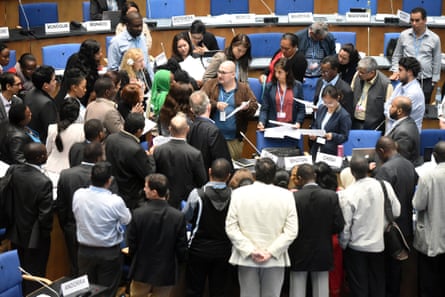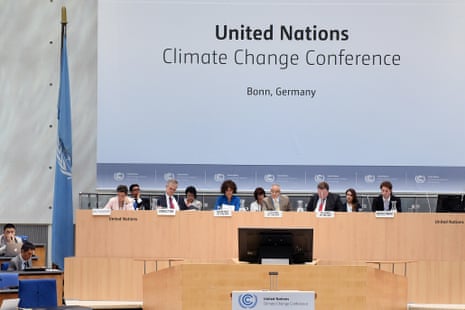Climate change negotiators meeting in Bonn on Thursday came up with a last-minute compromise that observers hope will put the talks on track for a new global agreement on greenhouse gases.
Slow progress was made until the final hours, as nations wrangled over the wording of an 89-page draft text, intending to cut it down to a more manageable size. After two weeks, the text had been cut by just four pages to 85.
But shortly before the talks were scheduled to finish, countries agreed that the co-chairs of the negotiations should be allowed to make their own alterations to the text, and present it to all countries for approval, probably in late July. This should be a quicker process, though there is no guarantee that countries will not try to re-draw the new draft when it becomes available.
The talks in Bonn were a staging post on the way to a crunch conference in Paris this December, at which countries are supposed to sign a new global agreement on limiting greenhouse gas emissions, to take effect from 2020 when current emissions commitments run out.
Elliot Diringer, executive vice president of the US Centre for Energy and Climate Solutions, told the Guardian: “There was little chance the parties themselves were going to be able to whittle down the text to a manageable size. Thankfully, they’ve entrusted the co-chairs to do that so they can get down to the real give-and-take next time. That’s a healthy sign.”
Samantha Smith, leader of the global climate and energy initiative at WWF, said: “Progress in Bonn has been slow, but a bigger concern is the growing gap between what is needed and what is being promised on finance and emissions. While much work remains to close that gap, there is hope that governments are finally committed to take more action on emissions prior to 2020.
“All countries have said that more ambitious, immediate emissions cuts are needed: however, that work needs to speed up if we are going to avoid the very worst impacts of climate change.”
The Bonn talks are a staging post on the way to a crunch conference in Paris this December, at which governments are hoping to sign a new global pact, to take effect from 2020, when current commitments from developed and large developing countries to limit their emissions are set to expire.
Jennifer Morgan, global director of the climate programme at the World Resources Institute, a US thinktank, pointed to progress made outside the talks, such as the G7’s vow to decarbonise their economies this century, and commitments by developing countries, cities and businesses on emissions.
“This week, strong signals were sent for ambitious climate action from outside the negotiations, but they did not inspire a faster pace in Bonn. Momentum is growing ahead of the Paris climate talks [but] the modest progress made in Bonn did not match the significant action taking place around the world.”
The talks have been mired in discussions ranging from concern over whether rich countries will follow through on their current pledges to provide financial assistance to the poor world, to arcane quibbles over single words in the text.
At one point, the discussion was divided over whether to use the terms “differentiated commitments/contributions”, referring to targets on cutting emissions, or the term “commitments/contributions/action”. The former was preferred by China, the latter by the US.
The distinction may seem trivial, but it points to some of the entrenched attitudes that have dogged the talks over more than two decades.
“Differentiated” comes from a term used in the original UN treaties, as “common but differentiated responsibilities” was used as the way of encoding the fact that all countries, developed and developing, have an interest in alleviating climate change, but that their responsibilities varied based on historical emissions and economic development.

China is adamant that the phrase, known as CBDR in the UN jargon, is core to any existing or potential new agreement, but the US – though it accepts the principle – is wary of the phrase because it believes it has been used in the past to draw a clear dividing line between developed and developing countries. These categories are no longer so clear-cut, according to the US, because of the rapid progress of emerging economies. China, for instance, is now the world’s biggest emitter and second biggest economic power.
Moving beyond these entrenchments was always going to be a struggle, and the Bonn talks have proved no exception to the routine of long and difficult meetings, bogged down in detail, that have characterised the long-running negotiations.
However, some delegates found room for optimism in the fact that, unlike previous meetings, this fortnight’s talks have not been fractious. “There has been no drama, no theatrics,” said Diringer. “The atmosphere has not been like that.”
He praised the co-chairs of the talks, who will be key to getting countries together to form an agreement. “The co-chairs have done a very artful job of building trust and that’s paying off. All the issues are still on the table, and there’s enormous work to be done, but there’s a clear plan for moving forward. That’s probably the best we could have hoped for at this stage.”
Mohamed Adow, senior climate change adviser at the charity Christian Aid, said that a meeting of key ministers, pegged for late July in Paris, must clear the ground for an agreement.
“The crunch issues that ministers need to work on are ensuring that the Paris deal is funded, that it protects vulnerable communities and it has a mechanism to increase ambition over time. It is vital that when ministers meet in Paris on July 20-21 that they resolve these sticking points so that when formal talks resume in August countries will have no excuses.”

Comments (…)
Sign in or create your Guardian account to join the discussion